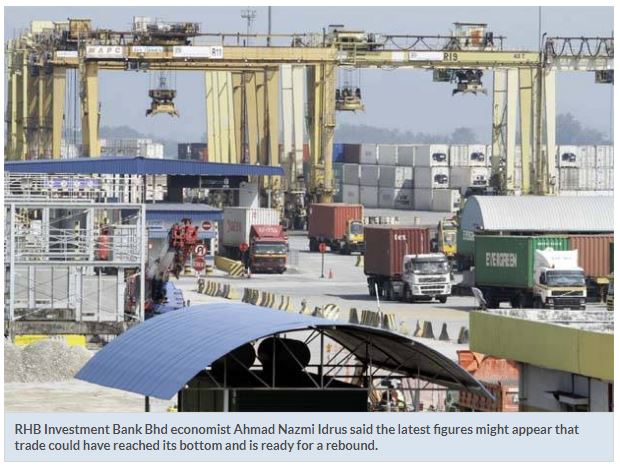Malaysia’s export to expand 1.5% this year, say economists
KUALA LUMPUR: Malaysia is expected to achieve an export growth of 1.5% year-on-year (y-o-y) this year, underpinned by commodity-based sectors, according to economists.
RHB Investment Bank Bhd economist Ahmad Nazmi Idrus said the latest figures might appear that trade could have reached its bottom and is ready for a rebound.
He said the support came from better palm oil prices in recent months and demand from non-electrical and electronics, as well as non-commodity products as reflected in the December 2019 manufacturing purchasing managers’ index data.
“Looking ahead, we expect export growth to remain around 1.5% for 2020, with a possible upside revision if the pattern of recovery continues, ” he said in a research note.
However, the investment bank is still wary of certain weaknesses, especially with the expectations of modest growth in China and the United States.
Malaysia’s total trade recorded positive growth in December 2019 at 1.9% y-o-y, ending a six-month contraction streak as both export and import grew.
Export in December 2019 expanded by 2.7% y-o-y after four consecutive months of negative growth, while import increased tepidly by 0.9% y-o-y following two months of decline.
For full year of 2019, total trade fell by 2.5% y-o-y while export declined by 1.7% y-o-y.
“For 2020, we forecast export growth to recover slightly by 1.5% y-o-y, ” MIDF Research said in its Economic Review.
It said commodity-based sectors, particularly liquefied natural gas exports, was expected to perform well, especially with the Petronas Floating LNG Facility 2 expected to be operational this year.
The research firm also said that the uncertainties over trade war and loss of growth momentum in some major economies would continue to affect exports performance, with another potential risk factor being the novel coronavirus outbreak. — Bernama
Source: https://www.thestar.com.my/business/business-news/2020/02/05/malaysias-export-to-expand-15-this-year-say-economists


 English
English




